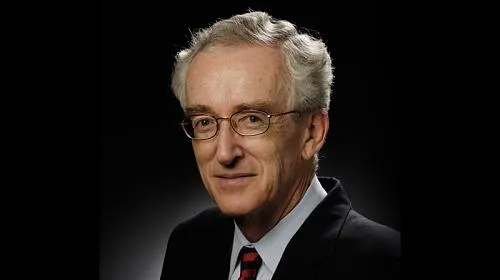Peter Bell, a former president and CEO of CARE, one of the world’s largest humanitarian organizations, died after a five-month battle with cancer at Massachusetts General Hospital on April 4, 2014. He was 73.
The entire CARE family mourns the passing of one of its most influential leaders who is widely credited for CARE’s shift to addressing underlying causes of poverty rather than simply treating its symptoms.
“Peter had an incredible passion for CARE and our mission,” said Helene D. Gayle, president and CEO of CARE, who succeeded Bell in 2006. “He was an unwavering champion for the rights of the poor, for social justice and had an important role in shaping CARE into the organization it is today.”
When Peter joined CARE in 1995, he took the helm of an organization with 50 years of experience relieving suffering around the world. CARE excelled at managing complex logistical systems during emergencies and at meeting the dire needs of people in extremely poor communities. But it was clear at the time of Peter’s arrival, that CARE needed to do more.


Lincoln Chen, CARE’s board chair during much of Peter’s decade-long tenure, said Peter helped lead CARE to do just that. “Guided by his extraordinary moral leadership, talents and skills, sheer hard work and commitment to CARE’s mission, we have put dignity at the very heart of CARE’s work,” Chen wrote in a 2005 CARE annual report.
During Peter’s tenure, for example, CARE shifted the way it worked, moving more towards partnering with local governments and poor communities across a wide variety of sectors such as health and food security. CARE also introduced more education programs for marginalized girls and expanded its HIV/AIDS programs as well as its policy advocacy work. Peter also led CARE’s response to major emergencies including the Kosovo War and the Asian tsunami. The organization expanded its reach, increased the diversity of its staff and perhaps most importantly, its resources for fighting poverty all under Peter’s leadership.
While at CARE, Peter also emphasized the need to go beyond responding to the consequences of poverty to tackling its root causes. He argued that poor communities were denied the most basic rights, including, he once wrote, “the right to a future.” By considering the needs of poor families, the risks they face, the hard choices they must make and the opportunities available to them, he explained, CARE would be better able to understand the complexity of poverty. In his view, household livelihood security was CARE’s “bottom line. ”


He was committed to the belief that extreme poverty could be eliminated in our lifetime.
Peter’s interest in the wider world began in high school. He was in the first group of American students to go to Japan after World War II on an American Field Service scholarship. In 1960, after his sophomore year at Yale, he traveled to the Ivory Coast, with Operation Crossroads Africa, (an inspiration for the Peace Corps.) as part of a racially integrated group of American students to build a school. While there he witnessed Ivory Coast gain its independence from France and experienced the exhilaration of an Africa moving towards post-colony era.
After receiving his master’s degree at the Woodrow Wilson School of International Affairs at Princeton, Peter spent 12 years with the Ford Foundation, including a decade with its Latin American program.
At the time of his death, Peter was a senior research fellow at the Hauser Institute for Civil Society at Harvard University, where he was writing and working on a variety of issues related to humanitarian NGOs in the arena of development and diplomacy. He also served as chair of the facilitation group for the NGO Leaders Forum, a semi-annual retreat for chief executives of major U.S.-based international relief and development NGOs.
Guided by his extraordinary moral leadership, talents and skills, sheer hard work and commitment to CARE’s mission, we have put dignity at the very heart of CARE’s work.
– Lincoln Chen, CARE Board Chair
Before joining the Hauser Institute in 2008, Peter Bell was a visiting fellow at the Carter Center after he completed his tenure at CARE. He had earlier been president of the Edna McConnell Clark Foundation, senior associate of the Carnegie Endowment for International Peace, president of the Inter-American Foundation, and deputy undersecretary of the U.S. Department of Health, Education and Welfare.
His volunteer positions have included serving as co-chair of the Inter-American Dialogue, chair of the Bernard Van Leer Foundation, chair of CARE USA, a director of Human Rights Watch, a director of the International Center for Research on Women, and a trustee of the World Peace Foundation. He spoke Spanish and Portuguese and has lived in Chile, Brazil, Mexico, Ivory Coast and Japan.
Bell is survived by his wife, Karen and two children, Jonathan and Emily. The family has created a memorial website where all are welcome to share their remembrances: www.forevermissed.com/peter-dexter-bell
A memorial service will be held on Wednesday, April 23, at 11 a.m. at the Universalist Unitarian Church, Gloucester. A reception will be held immediately following the service at the Gloucester House Restaurant. Read more about Peter’s life in the Gloucester Daily Times’ obituary here.
If you would like to make a memorial gift to CARE in honor of Peter Bell, please click here
For more information, please contact Nicole Harris, media relations for CARE. 404-735-0871 nharris@care.org

